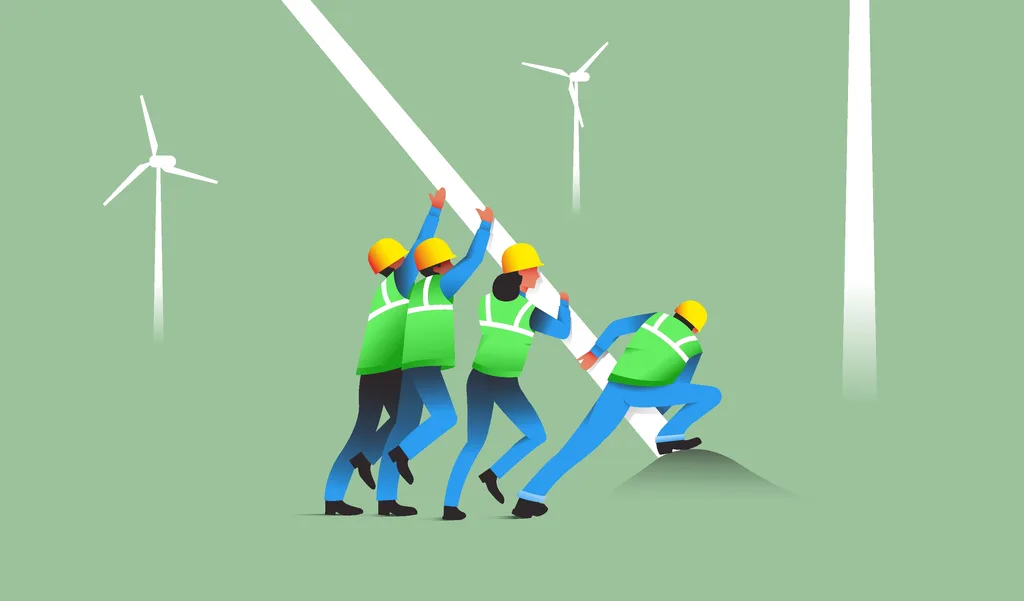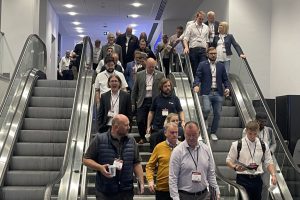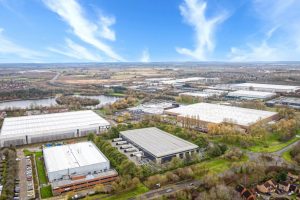The Net Zero battle rages on
Logistics service providers have highlighted stumbling blocks on the road to Net Zero, but are also highlighting how the industry is making strides to assist end users with this historic challenge.

IF WE don’t do it, who will? The logistics sector bears significant responsibility for helping UKplc achieve its net zero goals. Here, Logistics Matters talks to a number of key players to hear of progress being made and challenges to be overcome.
Helen Flanagan, product director, Wincanton
“The transport sector is responsible for a quarter (24%) of the UK’s greenhouse gas emissions, so we all have a critical role to play in sustainability. This was echoed by Wincanton’s recent survey which showed 83% of supply chain decision makers see logistics as key to reaching net zero goals.
“But while 66% say they are under pressure to hit their net zero targets, the same number have had to de-prioritise these efforts due to cost pressures.
“Many businesses are having to deprioritise their goals due to cost pressures (66%, according to our survey). Cost and CO2 savings shouldn’t be seen as mutually exclusive. By innovating and employing the right technology, logistics service providers can drive productivity through optimisation, and hence reduce CO2.
“Our survey shows that two-thirds (65%) of respondents believe collaboration is key to the future success of the industry, in relation to reducing CO2. Tech can help, EyeQ, Wincanton’s fully managed transport solution, can help reduce costs and cut CO2 emissions by up to 12%.
“It’s not just consumers that are demanding more environmentally friendly ways to fulfil their goods. The survey unveiled the pressures businesses face to hit net zero targets come from many directions: from their ESG teams (81%), their board (78%) and their procurement teams (72%), and their customers (72%).
“It’s also clear that the availability, affordability and viability of alternative fuel vehicles is a big issue. On average, supply chain decision makers believe that these vehicles will only become widely viable in five years, according to our survey. Nevertheless, at Wincanton we’ve made good headway, for example our adoption of electric vehicles in partnership with IKEA and the widespread use of HVO with Screwfix.”
Saul Resnick, chief executive officer, DHL Supply Chain
“Introducing new technologies and green energy into warehousing can help to boost net zero efforts. LSPs can also support the transition to a circular economy by facilitating reverse logistics, recycling and remanufacturing processes.
“At DHL, we have clear environmental targets in place and we measure and manage these KPIs across the group using our financial systems – just as we do for revenue – to track the progress that we are making in improving our carbon efficiency. We publish this externally and continuously work towards incorporating additional sustainability indicators into our reporting, and hold ourselves accountable for year-on-year improvements and achievements.
“Using a combination of sustainable fuels alongside our rollout of electric vehicles means that we can start tackling climate change at a more efficient rate while zero-emission vehicles continue to evolve, and their supporting infrastructure and energy strategies develop.”
Charlie Shiels, chief executive officer, ArrowXL
“As the CEO I get monthly reports highlighting our energy use, (gas and electricity, and water) and our recycling rates. We’re really proud that 95% of our waste doesn’t go to landfill and we’re working on the other 5% at the moment. We have solar panels on two of our buildings and we’re BREEAM certified at two of our warehouses. Of course, we have more to do but achieving net zero is a journey and we’re committed to leading our industry with our sustainability policies.
"As part of our net zero strategy we recently launched our OneFleet service which is designed to streamline operations and reduce our carbon emissions. By optimising our route planning we will reduce the total number of delivery routes by 75 per week, and the number of vehicles on the road by 40-60 per week – saving over 800,000 miles per annum.
“2024 is the year of cost and while the economy remains unstable and consumers and retailers are struggling, it’s difficult for us to invest in sustainable technologies, such as electric vehicles, renewable energy sources, and energy-efficient infrastructure. These initiatives require substantial upfront capital, which many logistics companies simply don’t have at the moment.
“Also, lack of infrastructure is a huge obstacle for sustainable logistics. Insufficient charging stations for electric vehicles and inadequate facilities for renewable energy integration make the process a lot harder. And unfortunately the current technology for sustainable logistics, like electric trucks with long-range capabilities, is still developing and just don’t meet the operational needs for our business model."
Tom Fowler, head of compliance, Kammac
“On a people focused front, staff training programs like Kammac's "go-green" team educate employees on reducing waste and plastic use both at work and at home, emphasising that small actions can lead to big changes.
“At Kammac, we ensure that all sustainability data is internally validated before making any external statements. We track and produce data for Scopes 1, 2, and 3, using UK government reporting guidelines. Annual reviews are conducted in line with the latest legislation and analysis to ensure measurement accuracy and transparency.

“The infrastructure for electric HCVs is lacking, making it more cost-effective and logistically sensible to move to HVO for now. This switch can provide a 90% CO2 reduction in comparison to standard diesel vehicles.”
Matthew Heaton, VP operations, Huboo
“Logistics Service Providers should consider providing clients with options that are likely to contribute to net zero.
“We want our warehouses to be as sustainable as possible. With solar panels installed on our most modern warehouses, we have a BREEAM ‘Excellent’ rating, putting them in the top 10% of warehouses in the UK for sustainability. We also have automatic, lower level and low energy lighting; and our fleet of MHE are all electric.
"As a fulfilment partner, we opt to use recyclable packaging wherever possible. Our flexible hub model means we can also give clients the option to use their own custom recycled packaging materials for their products. For example, one of our clients DASH Water uses shippers and trays that are 70% FSC Mix and fully recyclable, helping to protect the world’s forests. The brand also uses shrink wrap made from 50% post-consumer recycled plastic – essentially using plastic that would have ended up in landfill otherwise. DASH Water cares about the environment and doing its part to help the planet, so we're pleased to support with this goal through the brand’s fulfilment.”
Catherine Hughes, environment & sustainability manager UK, Ireland and Nordics, CEVA Logistics
“We are focused on three near-term levers in our roadmap to reaching net zero. First, our fleet. Second, our warehouses. Third, and most significantly in terms of emissions, the transport we purchase (Scope 3) from our carrier partners for our customers.
“With the move away from fossil fuels, fitting electric vehicle recharging requirements around operational requirements and route optimisation will be absolutely key. Using our in-house technical experts, digitisation, and innovative new technology and programmes with key partners will ensure we can provide a service for the future.
“As part of our decarbonisation strategy, warehouses present a significant opportunity for all LSPs to reduce carbon emissions and contribute to net zero goals. By installing technology such as solar PV onto warehouse roofing space, we can provide a source of renewable energy for the grid. Industrial sites have a huge potential to become Net Zero and make a positive contribution to Net Zero targets.
“Supply chain transparency is the key to ensuring that what an LSP says they are doing is happening. By publishing data and reports, stating factual rather than misleading or vague information, and pursuing projects and partnerships that add real value rather than contribute to greenwashing, we can build a culture of trust and sustainable stewardship. This, along with training and engagement, will help to ensure all employees across an organisation are acting in the best interest of both their business and the planet, giving you confidence in our sustainability efforts.
“The cost of innovating the new technologies that we need can be an immense challenge, which is then put onto the LSP at a very high premium to use that technology. As businesses wait for the cost to come down, the planet is still warming up. Equally, some businesses will be capable of transitioning to sustainable technology faster than others, usually due to cost, which will greatly reduce the availability of a sustainable subcontracted fleet available to hire; we all need to move together, or we all stand still.
“The energy network infrastructure is now struggling to catch up to demand; as more businesses look to install charging technology for vehicles, less capacity is left for others until some businesses are left to upgrade sub-stations at a huge cost or rely on potentially expensive battery storage options.
“Many LSPs also have short lease lengths and short customer contracts to tackle – working with customers to agree on long-term partnerships is crucial to unlocking sustainable innovation investment and the ability to sign longer lease terms to make upgrading facilities worthwhile for the LSP.”
Tom Jenkins, central services director, Europa Worldwide Group
“As a UK leader in groupage transport, we’re doing everything we can do to make positive steps towards sustainability, decarbonisation and zero emissions. Because groupage (for example) involves consolidating multiple shipments in one truck load, often double decks and long semi-trailers, it promotes more sustainable practice by minimising empty miles, maximising load fill and using the most direct routes to the final destination. This has cost benefits as well as being sustainable through our optimised groupage network.
“We’re also experimenting with carbon insetting within our European road freight division, Europa Road, with our use of hydrotreated vegetable oil (HVO-100) to replace diesel fuel on some routes from the UK and Netherlands.

“We’ve found the biggest obstacles in achieving net zero to be infrastructure and cost. For example, a drawback we found when trialling Electric Vehicles (EV) in Europa Road’s domestic fleet last year was that the technology and infrastructure simply wasn’t there to make it a viable decarbonisation option for transporting heavy consignments over long distances.
“HVO has been somewhat of a stepping stone for this but as ever, it doesn’t present a perfect solution given it is 30-40% more expensive than diesel, which is a significant financial undertaking for our customers.
“The options on the market now, while good contributions to a greener logistics market, don’t offer a perfect solution that can zero emissions. We need solutions which are scalable, sustainable and affordable to provide a strong impact at industry level.”
Chris Hyde, managing director of convenience and food services – GXO Logistics
“Logistics companies are uniquely positioned within the supply chain to contribute to net zero goals by reducing Scope 3 emissions. Our ESG journey is not just our own, and our customers rely on us to make their operations more sustainable.
“There are many examples of how LSPs can provide additional support to reduce emissions. Some of these include the use of alternative fuels such as compressed natural gas, experimenting with different technologies to make routes more fuel and battery efficient while minimising traffic delays, and creating urban logistics hubs to consolidate deliveries dispatched from various suppliers to reduce vehicle movements. LSPs can also use double deck trailers to maximise the amount of goods each lorry can carry, reducing the number of journeys taken overall.
“In the warehouse, LSPs can offer enhanced ‘rework’ services including basic repairs – replacing buttons, repairing zips and resetting and repairing electronic devices for resale. For a long time, faulty items would simply be discarded and sent to landfill. There was no formal system to sort, evaluate, refurbish and reuse faulty items. In 2023, we saw 35% of returns being reworked to enable them to be returned for full priced sale rather than written off and sent to landfill – this is something we’re really proud of.
“Another example is the ability to find outlets for harder-to-recycle materials. For example, expired medical gowns which can be upcycled into grocery tote bags and old sneakers can be ground up and reconstituted into safer ground cover for playgrounds. Leading providers can also track properly recycled e-waste, ensuring ethical handling.
“We currently have a number of electric vehicles along with low carbon alternatives to diesel, with plans for our fleet to have zero new diesel vehicles by 2035.
“The current technology, however, makes it difficult to rely totally on electric vehicles. Electric lorries are currently limited by the ranges available, vehicle payloads, and the time they take to charge. This is intensified by a lack of charging infrastructure, energy capacity and the high capital costs required to purchase vehicles.
“While we trial and adopt new methods, it is imperative that we continue to innovate by working with customers, vehicle manufacturers and property partners to find long-term solutions that will eradicate carbon emissions for good.”






